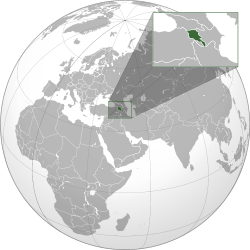Armenia, Hungary In Diplomatic Fallout – OpEd
By VOR
By Natalya Kovalenko
Armenia has severed diplomatic ties with Hungary after that country released the killer of an Armenian military officer. Street protests have erupted in Yerevan. Armenia’s armed forces are on heightened alert.
In 2004, the Armenian officer, Gurgen Markaryan, was axed to death by an Azeri colleague, Ramil Safarov, as both were attending NATO English language courses in Budapest. In 2006, a Hungarian court sentenced the killer to life imprisonment without a possibility of parole. This Friday, however, Hungary turned him over to Azerbaijan, where he was immediately granted a presidential pardon.

Dr Azhdar Kurtov is a leading expert at the Russian Institute of Strategic Studies:
“Being an oil power, Azerbaijan is immensely richer than Armenia. It successfully uses its oil wealth as a foreign policy instrument. Hungary, whose economy is often likened to that of Greece, badly needs financial assistance, and it may be looking to Azerbaijan for rescue funds.”
Dr Yana Amelina heads the Caucasus sector of the same Institute:
“Severing diplomatic ties is a natural reaction to a development of this kind. At the same time, it has drawn attention to the international weakness of Armenia. Yerevan has failed to keep Safarov’s case in focus, which allowed Hungary to quietly release the convict.
Many people in Azerbaijan, including senior officials, regard Safarov as a national hero. His return boosts the country’s morale and bolsters its international standing. It also weakens the position of Armenia. Hungary’s decision to release him may also add fuel to the Azeri-Armenian conflict over Nagorny Karabakh.”
Russian political analyst Dr Vladimir Bruter sees a silver lining for Armenia:
“The Armenian lobby in Western countries can help Armenia gain moral high ground in the Safarov story and persuade Western governments that Azerbaijan is not trustworthy. Indeed, the US Department of State has already criticized Azerbaijan for failing to deliver on its promise to keep Safarov behind bars, in accordance with the sentence handed down to him in Hungary.”
